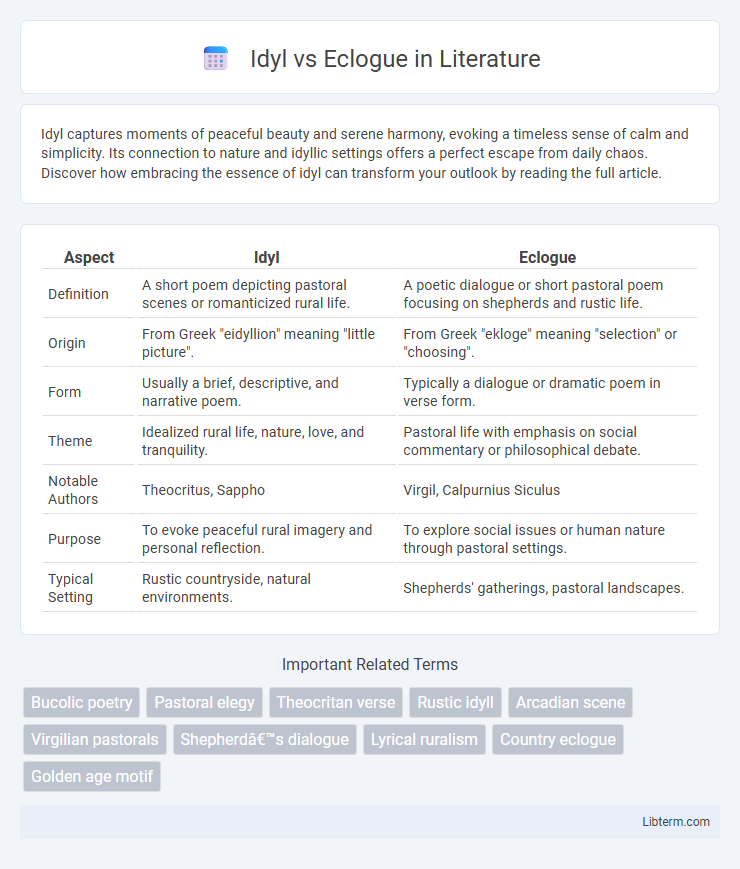Idyl captures moments of peaceful beauty and serene harmony, evoking a timeless sense of calm and simplicity. Its connection to nature and idyllic settings offers a perfect escape from daily chaos. Discover how embracing the essence of idyl can transform your outlook by reading the full article.
Table of Comparison
| Aspect | Idyl | Eclogue |
|---|---|---|
| Definition | A short poem depicting pastoral scenes or romanticized rural life. | A poetic dialogue or short pastoral poem focusing on shepherds and rustic life. |
| Origin | From Greek "eidyllion" meaning "little picture". | From Greek "ekloge" meaning "selection" or "choosing". |
| Form | Usually a brief, descriptive, and narrative poem. | Typically a dialogue or dramatic poem in verse form. |
| Theme | Idealized rural life, nature, love, and tranquility. | Pastoral life with emphasis on social commentary or philosophical debate. |
| Notable Authors | Theocritus, Sappho | Virgil, Calpurnius Siculus |
| Purpose | To evoke peaceful rural imagery and personal reflection. | To explore social issues or human nature through pastoral settings. |
| Typical Setting | Rustic countryside, natural environments. | Shepherds' gatherings, pastoral landscapes. |
Introduction to Idyl and Eclogue
Idyl and eclogue represent distinct poetic forms rooted in pastoral traditions, with the idyll typically portraying a brief, idealized scene of rural life emphasizing simplicity and natural beauty. Eclogues consist of pastoral dialogues or monologues often exploring themes of love, politics, or rustic life through multiple characters, reflecting a more structured narrative form. Both genres originated in ancient Greek and Roman literature, with Theocritus credited for the idyll and Virgil renowned for his eclogues, shaping their lasting influence on pastoral poetry.
Origins and Historical Context
Idyls originated in ancient Greek poetry, primarily associated with Theocritus in the 3rd century BCE, characterized by pastoral themes and depictions of rural life. Eclogues, derived from the Latin term for "selections," evolved during the Roman period with Virgil's Bucolica in the 1st century BCE, blending pastoral motifs with political and social commentary. Both genres reflect an idealized vision of nature, yet eclogues incorporate broader allegorical elements related to Roman culture and governance.
Defining Idyl: Characteristics and Themes
Idyl is a short poem or prose piece that idealizes rural life, often portraying pastoral scenes with simplicity and tranquility. Characterized by its emphasis on natural beauty and peaceful countryside settings, idyls explore themes such as innocence, harmony between humans and nature, and rustic simplicity. Unlike the more structured eclogue, idyls evoke a serene atmosphere through vivid descriptions and intimate reflections on rural existence.
Understanding Eclogue: Key Features
Eclogues are short pastoral poems typically featuring dialogues between shepherds, emphasizing rural life and nature with themes of love, politics, and philosophy. Unlike idylls that often present scenic descriptions, eclogues focus on character interactions and dramatic narratives within a bucolic setting. Their structured dialogue and thematic depth make eclogues essential for studying classical pastoral literature.
Major Differences between Idyl and Eclogue
Idyl and eclogue differ primarily in thematic focus and structure, with idylls portraying peaceful, rustic life through short, descriptive poems emphasizing individual experiences, while eclogues present pastoral dialogues or narratives often involving shepherds and addressing broader social or political themes. Idyls typically center on serene, idealized rural scenes, utilizing lyrical and emotive language, whereas eclogues employ dramatic interaction and dialogue to explore moral or philosophical issues within a pastoral setting. The scope of idylls tends to be intimate and contemplative, contrasting with the eclogue's communal and allegorical approach.
Notable Authors and Works
The idyll is a short pastoral poem often celebrating rustic life, with notable authors such as Theocritus, who is credited with originating the form, and later, poets like James Thomson, famous for "The Seasons." Eclogues, a specific type of pastoral poem typically featuring dialogues between shepherds, were prominently written by Virgil, whose "Eclogues" set a high standard in Latin literature and influenced Renaissance poets like Edmund Spenser. Both forms emphasize bucolic themes, but Virgil's eclogues are particularly distinguished by their formal structure and political allegory.
Literary Functions and Purposes
Idyls typically depict pastoral scenes and simple rural life, serving to evoke tranquility and idealize nature through concise, vivid imagery. Eclogues function as dramatic dialogues between shepherds, often exploring themes of love, politics, and poetic inspiration with a more structured narrative form. Both forms emphasize the pastoral genre, but idyls highlight lyrical expression while eclogues prioritize interactive storytelling and thematic complexity.
Evolution in Modern Literature
The evolution of the idyll and eclogue in modern literature reflects a shift from classical pastoral themes to more nuanced explorations of human experience and social critique. Modern idylls emphasize tranquility and idealized settings, often integrating contemporary concerns such as urbanization and ecological awareness, while eclogues adapt their traditional dialogue form to address political unrest and personal identity. This transformation highlights the adaptability of both genres in capturing evolving cultural and existential narratives.
Influence on Other Art Forms
Idyl and eclogue have profoundly influenced other art forms, particularly painting and music, by inspiring pastoral themes that evoke rural tranquility and natural beauty. Idyl, with its concise and intimate depiction of rustic life, shaped the visual representation of simple countryside scenes in Renaissance and Romantic art. Eclogue's dialogue-driven pastoral poetry often provided librettos for baroque and classical music compositions, emphasizing pastoral ideals and shepherd life portrayed through harmonious and lyrical motifs.
Conclusion: Idyl vs Eclogue in Literary Tradition
Idyl and eclogue both hold vital places in literary tradition, with idylls emphasizing pastoral simplicity and personal reflection, while eclogues focus on dramatized dialogue within rural settings. The idyll's concise and lyrical style conveys intimate scenes, whereas eclogues typically explore social or political themes through character interactions. Together, they illustrate the diversity of classical pastoral literature and its enduring influence on poetic genres.
Idyl Infographic

 libterm.com
libterm.com